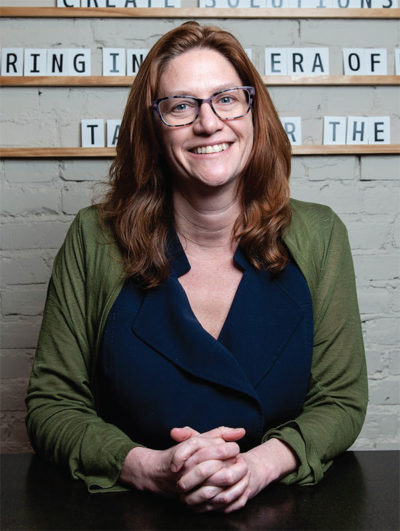
Photo: Chona Kasinger
Kristine Ashcraft, MBA’10, CEO of YouScript
Kristine Ashcraft, MBA’10, likes to employ the metaphor of a five-highway intersection when describing how Seattle-based YouScript helps deliver precision medicine.
“Most of the time,” says Ashcraft, CEO of YouScript, “when we take medications, they are processed by five main enzymes of the liver.” Think of these enzymes like highways, she says. Traditionally, doctors have prescribed medicine as though each highway functions identically in every patient. But genetic variations, other drugs, over-the-counter substances, and diet can block roads, close lanes, or create detours.
“YouScript predicts metabolic traffic jams,” says Ashcraft. Its software flags patients at risk of gene-based adverse drug reactions. Testing for relevant genetic variations is completed by partnered labs, and the secured information is used by electronic medical records and pharmacy software systems to avert adverse drug interactions. Competing programs might perform a simple “yes-no” version of predicting bad drug interactions, but YouScript, says Ashcraft, is unique in moving “beyond the binary,” assessing multiple variables at once.
She sees YouScript as well positioned to ride the wave that some view as health care’s future—precision medicine, the science of targeting treatments to specific patients and tailoring medical decisions, prescriptions, and products to individual needs. It’s an emerging field made possible by advances in genetic testing and other diagnostic and predictive tools.
When precision medicine began to gain momentum, Ashcraft already had spent years working in genetic testing. She earned her undergraduate degree in molecular biology but soon realized that lab work was not for her. Instead, she went into sales; when she heard of a position at a genetic testing lab, she thought it would be a good way to utilize her degree. She joined Genelex in 2000, eventually becoming CEO. Genelex was founded as a forensic crime lab but, seeking ways to leverage its technology, branched into broader testing and in 2016 spun off YouScript. Along the way, Ashcraft earned her Babson MBA in a program then based in Portland, Oregon. The experience, she says, was invaluable. “We’ve raised $8.6 million to date, and I couldn’t have done that without my Babson education.”
Ashcraft waxes enthusiastic when she talks numbers, describing how studies have shown that YouScript can result in a 52 percent drop in hospital readmissions, an 85 percent drop in patient deaths due to medication mishaps, and a savings of more than $4,000 per patient in 60 days. But she’s positively impassioned when it comes to putting a human face on what YouScript can accomplish. She tells the stories of Elise, whose Alzheimer’s-like symptoms resolved when genetic testing led to a change in her medication, and, on the flip side, of Michael, a child who died from an overdose because he had an undetected genetic variation.
The work, Ashcraft admits, can be frustrating. “Only crazy people go into health care,” she says with a laugh. “The economics are frankly broken, and it’s a long haul.”
But the lofty goal and the urgent need keep her focused. “We’re going to fix medication management,” she says. “Stay tuned.”—Jane Dornbusch
